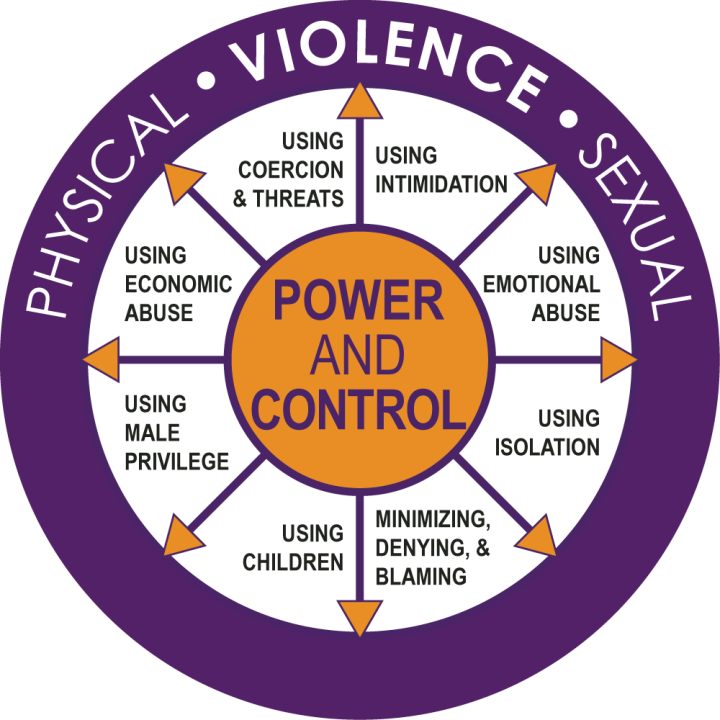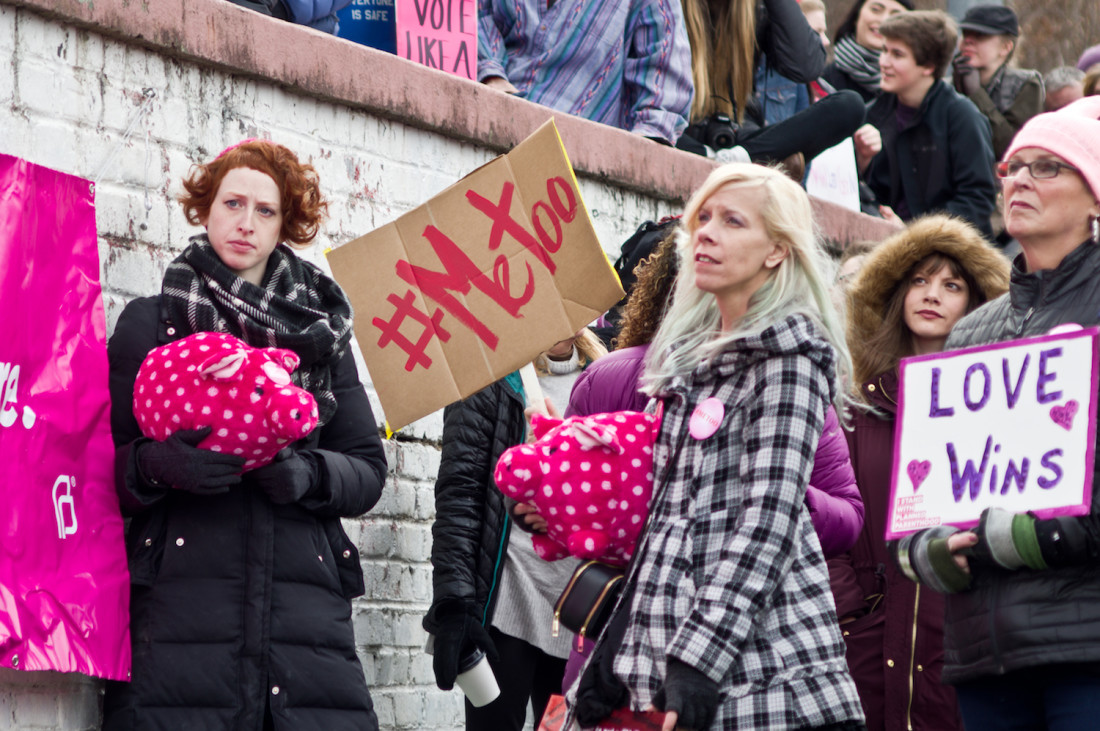“The ‘Me Too’ movement has been phenomenal,” says Angelica Wind, executive director of Our VOICE, Buncombe County’s rape crisis and prevention center. “We are astounded as to what we’ve seen at the local level and at the national level.” In the months since the movement gained worldwide headlines last October in connection with allegations of sexual misconduct against film producer Harvey Weinstein, Our VOICE has seen a 50.48 percent increase in clients accessing its services. “It isn’t as though there is suddenly a higher prevalence of sexual violence or harassment,” notes Wind. “The difference is that survivors feel that it is safe for them to come out, and that the stigma has been eroded to a certain extent.”
Other local service providers echo those sentiments.
The Buncombe County Family Justice Center, which provides coordinated services to survivors of domestic and sexual assault, has also seen an increase in women seeking help. “Anecdotally, we are hearing that lots of people have been impacted by the ‘Me Too’ movement and are finding that strength and courage to come forward and seek additional services,” coordinator Julie Klipp Nicholson reports.
April Burgess-Johnson, executive director of Helpmate, also has high praise for the social media phenomenon. “The ‘Me Too’ movement is a beautiful and long overdue thing in our social consciousness and in our country,” she declares. “Workplace harassment and sexual violence are crimes that, for way too long, have been hidden in the shadows and shrouded in shame and silence. It’s unfair that victims of these types of crimes are treated differently than victims of other types of crimes.” Helpmate, an Asheville-based nonprofit, provides safety, shelter and support to survivors of domestic violence and also works to enlist community support for change.
Most of the calls to Helpmate’s crisis line, says Burgess-Johnson, are from people who have recently experienced abuse. But since last fall, the nonprofit has been getting more calls concerning incidents that happened further back in the past. “They’re calling us and saying, ‘All of this conversation and awareness in the community has really made me think about my experience, and it’s brought up some things for me that I want to talk through,’” she explains.
Deep roots
Like the issues that “Me Too” is bringing up, however, the movement’s roots go much deeper. In 1997, Tarana Burke was working at a camp for youth in Alabama. When a young girl confessed that she was being sexually abused, Burke could not find the strength to tell the girl that she’d had a similar experience herself. That bothered Burke, however, and nearly 10 years later, she founded the nonprofit Just Be Inc., gradually growing “Me Too” into a program to support young victims of sexual assault, abuse and exploitation.
Meanwhile, as the allegations against Weinstein mounted, actress Alyssa Milano took to Twitter encouraging women who’d been sexually harassed or assaulted to use the hashtag “me too” to demonstrate the extent of the problem. Milano wasn’t aware of Burke’s work, but her call to arms unleashed a tsunami of testimony from women across the country and beyond, including here in Asheville.
In the process, the movement has highlighted how deeply ingrained misogyny and sexual violence are in our culture.

Vulnerable workers
Susan Simmons (not her real name) is a student at Asheville-Buncombe Technical Community College. Last year, she says, her employer, who has no connection with the school, sexually harassed her and touched her without her consent. And when she spoke out about the harassment at work, she reports, she was shamed by her co-workers and her supervisor. “It was absolutely terrifying to be living in a reality in which my voice didn’t matter,” says Simmons. When the harassment didn’t stop, she quit her job.
But that kind of all-or-nothing choice puts many employees in a vulnerable position. “Working people are precarious,” notes Eva Hesse (not her real name), who says she uses the pseudonym to avoid being isolated and targeted. Hesse is a member of the Asheville Survivors Coalition, an ad hoc group that supports survivors of sexual assault and harassment. “Many people can’t afford even a couple of weeks unemployed to look for a new job,” Hesse points out. “It’s really hard to be experiencing something that you know is not fair but you don’t have a safety net.”
The trauma of speaking out about her workplace abuse still affects Simmons, but she says “Me Too” gave her the courage to share her story. “I never would have spoken up if the ‘Me Too’ movement hadn’t happened. I never would have felt that people would support me and not just hate me. I don’t have words for the fear that comes with telling the community that you’ve been abused by someone that they love.”
Community response
Sexual violence, local activists say, exists against a backdrop of cultural complicity, and addressing the problem will require a communitywide shift.
“At Our VOICE, we feel that how a community responds to a disclosure of sexual violence sets the tone to whether other survivors will come out of the shadows and disclose as well,” notes Wind.
The community surrounding the victim, says Simmons, must step into the role of advocate. “One big takeaway from the ‘Me Too’ movement and how it affected me is my understanding of the victim, the perpetrator and the bystanders/community,” she explains. “The perpetrator is on one side of the teeter-totter, and the person being abused is on the other. The bystander can either stand in the middle and have no effect, and say, ‘It’s their marriage; it’s an issue between boss and employee,’ or they can say, ‘This is our problem; this is a place where I am empowered to act.’ It’s often not safe for us to speak out, so that bystander needs to walk that plank out to the survivor and say, ‘You have the right to speak, and I’m going to stand by you so you’re not hurt.’”
Creating lasting change
But beyond that, these activists maintain, we have to address destructive, deep-seated cultural norms in order to create lasting change. “We need to have a critical conversation about gender,” says Burgess-Johnson. “We need to talk about what healthy gender roles look like. For too long in our society, there has been a culture of toxic masculinity. It’s not just harmful to women: It’s harmful to men as well. It puts a lot of unfair expectation on them for behavior that may not be intuitively comfortable for them. I think what toxic masculinity robs from men is that full range of human expression. The ‘Me Too’ movement is showing what it robs from women — that we often suffer the violent end of that toxicity. But in the end, we all lose.”
Those conversations, she believes, need to happen at both the individual and the community level, and must make it clear “that only yes means yes, but also that when I tell you to give me some space, that means that you don’t text me 52 times. Communicating boundaries doesn’t mean that I don’t care about you: It means that I also care about me and that I deserve some space. That has to be an acceptable and healthy thing in a relationship.”
In terms of society as a whole, notes Wind, Our VOICE approaches the problem “through the lens of the public health model … working with the individual, working within the community, looking at the national and public policy level. The best way I can explain it is, in the 1980s and prior it was perfectly OK for individuals to drink a six-pack of beer and get behind the wheel, and then somewhere in the late ’80s or early ’90s there was a strong movement around anti-drunk driving. There were lots of things happening in numerous spheres that allowed for a shift in social attitudes and norms. … We were hearing it, we were seeing commercials, we were looking at tougher laws around drinking and driving. In the local schools, people would talk to students about the dangers of drinking and driving. And we now have seen that shift, where someone is going to ask you, ‘Are you OK to drive? Can I call you a cab?’
“We feel that we can have the same impact with sexual violence, if … we can switch attitudes and norms to where someone will say, ‘No, that rape joke was not OK. No, it’s not OK for you to objectify your server. No, it’s not OK for you to sexually harass your staff. And so forth.”
Equal rights for all
Some advocates, however, argue that a fundamental legal change is also needed. Although laws such as the Equal Pay Act, the Pregnancy Discrimination Act and Titles VII and IX of the 1964 Civil Rights Act were designed to protect women from gender-based discrimination, many activists say that’s not enough.
Supporters of the Equal Rights Amendment have been trying to get explicit legal protection for women into the Constitution since 1923, when Alice Paul, an activist who’d fought for women’s suffrage, introduced the ERA. Half a century later, in 1972, it was approved by both houses of Congress but failed to gain ratification by the 38 states needed for it to take effect.
“We need two more states to ratify to make it a constitutional amendment,” explains Ellen Perry, an ERA-NC Alliance action team member for the 11th Congressional District. “North Carolina is one of the states that has not yet ratified.” Even if that happened, however, there would be legal complications, because the ratification deadline has passed and several states later rescinded their ratifications.
Nonetheless, says Ann Von Brock, “Until equal rights are guaranteed in the U.S. Constitution, women are not full citizens. The statutes and case law that have produced major advances in women’s rights since the middle of the last century are vulnerable to being ignored, weakened or reversed,” explains Von Brock, who serves on the ERA-NC Alliance’s board and the 10th Congressional District action team. “By a simple majority, Congress can amend or repeal anti-discrimination laws, the administration can negligently enforce such laws, and the Supreme Court can use the intermediate standard of review to permit certain regressive forms of sex discrimination.”
Despite those daunting obstacles, however, local professionals who’ve worked with survivors of sexual assault and misconduct for years are hopeful. “I have not seen a movement quite to this magnitude since I have been doing this work,” says Wind. “What is currently happening at the local level here in our community, where survivors are feeling empowered and, for the first time, speaking out to their experience that ‘Me too, this happened to me’ — there’s a lot of power in that.”




“me too” is a bit played out now…we get it everybody including men have regrets.